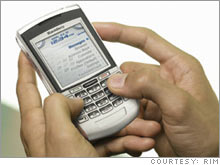|
Setback for BlackBerry maker
High court rejects Research in Motion petition to review ruling that could shut e-mail service.
NEW YORK (CNNMoney.com) - BlackBerry maker Research in Motion was dealt a setback Monday after the Supreme Court turned down a request to review a major patent infringement ruling against it. The move takes away yet another barrier between BlackBerry users and service interruptions. There are more than 4 million users of the BlackBerry e-mail service.
Research In Motion (RIM) had petitioned the Supreme Court to review a federal appeals court ruling that could lead to a shutdown of most U.S. BlackBerry sales and service. The High Court's decision puts NTP's damages award and request for a permanent injunction back in front of the district court, said Jonathan Caplan, a partner in the intellectual property department at Kramer Levin Naftalis & Frankel. The legal issue confronting RIM goes back five years. In 2001, NTP, a patent holding company, filed a suit against RIM claiming that the BlackBerry infringed on its patents. A jury found in favor of NTP and awarded the company damages. Last year, RIM and NTP reached a tentative $450 million settlement, but the deal fell apart. NTP is scheduled to file a request for an injunction on Feb. 1, although the judge who will rule on that request has not set a timetable on when to expect that decision. "From our standpoint, we're being very reasonable. It's up to (RIM) whether they want to be shutdown," James Wallace, lead trial counsel for NTP, told CNNMoney.com. RIM said in a statement that it was not banking on the Supreme Court review: "The Patent Office continues its reexaminations with special dispatch, RIM's legal arguments for the District Court remain strong and our software workaround designs remain a solid contingency." But the Supreme Court's decision to not review the case doesn't bode well for RIM, according to Ken Weitzman, a partner at legal firm Chadbourne and Parke in New York. "There will likely be an injunction. The question is what is the scope of the injunction," Weitzman said. The court has discretion. In a worst-case scenario, an injunction could force RIM to shut down the BlackBerry system, potentially affecting most of RIM's approximately 4.3 million U.S. subscriber accounts. NTP has said an injunction would not affect BlackBerry products used by U.S. federal, state, or local governments. "The negotiating position for RIM seems to be getting harder," Caplan said, adding that those who use the BlackBerry for commercial business purposes are most likely to be affected by an injunction. BlackBerry blackout?
But analysts said the Supreme Court decision wasn't surprising and that a blackout of the BlackBerry service is unlikely, even if an injunction is issued. That's partly because RIM has been preparing a contingency plan. "Not much has changed from yesterday to today," Rob Sanderson, an analyst with American Technology Research, said. He expects RIM to either settle with NTP or implement design changes to its system if faced with an injunction. RIM has not publicized details of its contingency software workaround designs but it said in a statement that "it intends to implement (them) if necessary to maintain the operation of BlackBerry services in the United States." A settlement is another outcome more likely than shutdown of the service, according to Ben Bollin, an analyst with FTN Midwest Research. NTP, a holding company that doesn't make its own products, would benefit more from a settlement than from a BlackBerry shutdown, analysts agreed. Bollin estimates a one-time payment of around $700 million to $1 billion would provide RIM with a wholly prepaid license to ensure the product's availability going forward. RIM (down $2.22 to $64.40, Research) shares were down nearly 3 percent in midday trading on the Nasdaq after having fallen by as much as 5 percent immediately after the ruling. |
|


